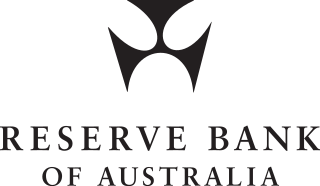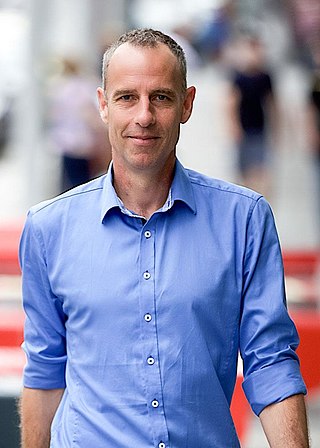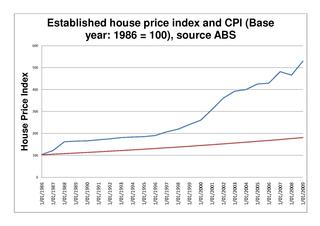
The Australian dollar is the official currency and legal tender of Australia, including all of its external territories, and three independent sovereign Pacific Island states: Kiribati, Nauru, and Tuvalu. As of 2022, it is currently the sixth most-traded currency in the foreign exchange market and also the seventh most-held reserve currency in global reserves.

The Reserve Bank of India, abbreviated as RBI, is India's central bank and regulatory body responsible for regulation of the Indian banking system. It is under the ownership of Ministry of Finance, Government of India. It is responsible for the control, issue and maintaining supply of the Indian rupee. It also manages the country's main payment systems and works to promote its economic development. Bharatiya Reserve Bank Note Mudran (BRBNM) is a specialised division of RBI through which it prints and mints Indian currency notes (INR) in four of its currency printing presses located in Nashik, Dewas, Mysore and Salboni. The RBI established the National Payments Corporation of India as one of its specialised division to regulate the payment and settlement systems in India. Deposit Insurance and Credit Guarantee Corporation was established by RBI as one of its specialised division for the purpose of providing insurance of deposits and guaranteeing of credit facilities to all Indian banks.

The Reserve Bank of Australia (RBA) is Australia's central bank and banknote issuing authority. It has had this role since 14 January 1960, when the Reserve Bank Act 1959 removed the central banking functions from the Commonwealth Bank.
The Reserve Bank of New Zealand is the central bank of New Zealand. It was established in 1934 and is currently constituted under the Reserve Bank of New Zealand Act 2021. The governor of the Reserve Bank, currently Adrian Orr, is responsible for New Zealand's currency and operating monetary policy.

The Commonwealth Bank of Australia (CBA), or CommBank, is an Australian multinational bank with businesses across New Zealand, Asia, the United States, and the United Kingdom. It provides a variety of financial services, including retail, business and institutional banking, funds management, superannuation, insurance, investment, and broking services. The Commonwealth Bank is the largest Australian listed company on the Australian Securities Exchange as of August 2015, with brands including Bankwest, Colonial First State Investments, ASB Bank, Commonwealth Securities (CommSec) and Commonwealth Insurance (CommInsure). Its former constituent parts were the Commonwealth Trading Bank of Australia, the Commonwealth Savings Bank of Australia, and the Commonwealth Development Bank.

Ian John Macfarlane is an Australian economist, and central banker. After an early career as an economist in Melbourne, Sydney, Oxford and Paris, he joined the Reserve Bank of Australia in 1979 and rose to become Governor from 1996 to 2006. After retiring from the Reserve Bank, he became a company director, economic consultant and author of two books.

The Australia and New Zealand Banking Group Limited (ANZ) is an Australian multinational banking and financial services company headquartered in Melbourne, Victoria. It is Australia's second-largest bank by assets and fourth-largest bank by market capitalisation.
Banking in Australia is dominated by four major banks: Commonwealth Bank, Westpac, Australia & New Zealand Banking Group and National Australia Bank. There are several smaller banks with a presence throughout the country which includes Bendigo and Adelaide Bank, Suncorp Bank, and a large number of other financial institutions, such as credit unions, building societies and mutual banks, which provide limited banking-type services and are described as authorised deposit-taking institutions (ADIs). Many large foreign banks have a presence, but few have a retail banking presence. The central bank is the Reserve Bank of Australia (RBA). The Australian government’s Financial Claims Scheme (FCS) guarantees deposits up to $250,000 per account-holder per ADI in the event of the ADI failing.

Nicholas James McKim is an Australian politician, currently a member of the Australian Senate representing Tasmania. He was previously a Tasmanian Greens member of the Tasmanian House of Assembly elected at the 2002 election, representing the Franklin electorate from 2002 to 2015, and led the party from 2008 until 2014. On 21 April 2010, he became the first member of the Greens in any Australian ministry. From February 2020 until June 2022, he served as co-deputy leader of the Australian Greens.

Glenn Robert Stevens is an Australian economist who was the Governor of the Reserve Bank of Australia from 2006 to 2016.

The Australian one-hundred-dollar note was first issued in 1984 as a paper note. There have been two different issues of this denomination: initially a very light turquoise-blue paper note, and from May 1996, a green polymer note. Since the start of issue there have been six signature combinations. Two other combinations were not issued.
The official cash rate (OCR) is the term used in Australia and New Zealand for the bank rate and is the rate of interest which the central bank charges on overnight loans between commercial banks. This allows the Reserve Bank of Australia and the Reserve Bank of New Zealand to adjust the interest rates that apply in each country's economy. The OCR cannot be changed by transactions between financial institutions as this does not change the supply of money, only its location. Only transfers between the central bank and an institution can affect the OCR.

Kenneth Ross Henry is an Australian economist and public servant who served as the Secretary of the Department of the Treasury from 2001 to 2011.

The Australian property bubble is the economic theory that the Australian property market has become or is becoming significantly overpriced and due for a significant downturn. Since the early 2010s, various commentators, including one Treasury official, have claimed the Australian property market is in a significant bubble.

Daniel Mulino is an Australian politician. He was a Labor member of the Victorian Legislative Council, representing the Eastern Victoria Region from 2014 to 2018. In the 2019 federal election he was elected as the inaugural Member for the Division of Fraser.

On September 17, 2019, interest rates on overnight repurchase agreements, which are short-term loans between financial institutions, experienced a sudden and unexpected spike. A measure of the interest rate on overnight repos in the United States, the Secured Overnight Financing Rate (SOFR), increased from 2.43 percent on September 16 to 5.25 percent on September 17. During the trading day, interest rates reached as high as 10 percent. The activity also affected the interest rates on unsecured loans between financial institutions, and the Effective Federal Funds Rate (EFFR), which serves as a measure for such interest rates, moved above its target range determined by the Federal Reserve.
Bendon Group is a New Zealand lingerie, underwear and sleepwear company. It includes the women's brands Bendon, Me by Bendon, Pleasure State, Lovable and Hickory, the fuller cup size brand Fayreform, and the men's brands Bendon Man and Davenport.
Guy Debelle is an Australian economist who is the former Deputy Governor of the Reserve Bank of Australia, having been appointed in 2016.

Barrenjoey Capital Partners (Barrenjoey) is an Australian investment banking firm that is headquartered in Sydney with additional offices in Melbourne and Perth.

Michele Bullock is an Australian economist who is currently governor of the Reserve Bank of Australia (RBA). She commenced as governor on 18 September 2023, and is the first woman to hold the role.














